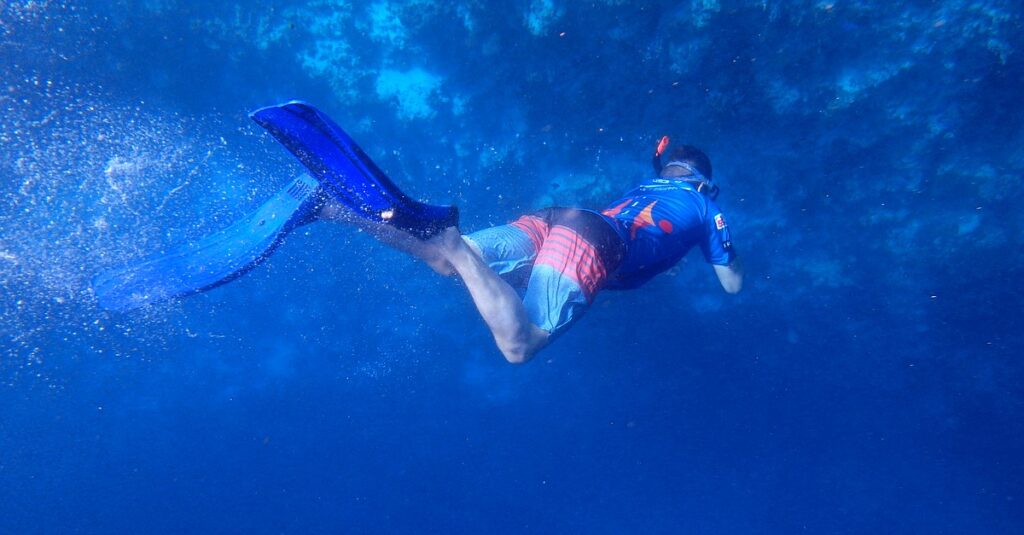

Immediately before freediving you should take one full exhale followed by a complete inhale in order to fill your lungs with air. After this, you should not exhale until you return to the surface of the water.
When freediving you should not normally exhale until you reach the surface after your ascent. Releasing your breath before this could deprive your body of oxygen and cause you to black out. Expelling the air from your lungs could also reduce your buoyancy in the water and require your muscles to work harder to return you to the surface.
The True Story Book of Freediving Champion Audrey Mestre and the Story of Her Death
View on Amazon: The Last Attempt (Opens new tab)


Top rated read
There are many rules and techniques to learn around breathing during freediving and it’s important to know when to exhale. This article explains how freedivers breath, how the lungs respond to freediving and some of the techniques you can use to stay safe and comfortable during your freedives.
How do free divers breathe?
While breathing is a normal, natural part of life, it’s important to practice and master some special breathing and breath-holding techniques in order to be able to freedive competently and safely.
As well as training your body to hold breath during an extended period of activity, you will need to learn the best way to breathe immediately before a freedive, including the last important inhalation before you descend. You also need to learn how to exhale and recover your breathing on return to the surface.
NB Advanced divers may sometimes use a partial exhalation on ascent, but beginner freedivers are taught not to exhale before reaching the surface.
What happens to your lungs when you free dive?
When you freedive, your body experiences massive pressures even when in depths of only a few meters. Water is far more dense than air and the pressure we experience in water is far greater than air pressure. At 10 meters depth, we’re under double the pressure experienced at sea level. Pressure increases by one bar (one additional sea-level atmosphere) for each further 10m we descend.
Gas volumes decrease in inverse proportion with pressure increases. The lungs and other airspaces inside the human body (e.g. ears, sinuses) therefore become compressed as we dive. A descent of 10 meters reduces lung volume by 50%.
Correct training and breathing techniques can help to manage the risks to lung health posed by pressure, hypoxia (low blood oxygen) and hypercapnia (high blood carbon dioxide). As a sport, freediving may actually boost overall lung function and capacity.
For more information on the effect on lungs from freediving, we’ve written a full article on what happens to lungs when freediving (opens new tab) which you can check out.
Do free divers hyperventilate?
Hyperventilation means over-breathing, or breathing more than the body requires. It can be dangerous in freediving and should be avoided. Instead, you should aim to remain very relaxed and in control of your breath both when preparing to dive, and when returning to the surface afterwards.
When you hyperventilate you run the risk of:
- blacking out in the water due to constriction of arteries supplying blood to the brain and reduced levels of carbon dioxide in the blood (blood carbon dioxide triggers the breathing mechanism),
- raising your heart rate and oxygen consumption rate (safe, controlled freediving is characterized by a slowing heart rate),
- shifting the body into a highly alert state (a calm, relaxed state is ideal for freediving).
- binding oxygen more tightly in the blood, reducing access to oxygen stores when your body needs them
How long can you hold your breath freediving?
Untrained people may only be able to hold their breath for 30 seconds or a minute. With several months of training, many freedivers can learn to hold their breath for two to five minutes.
The world record for an underwater breath-hold without without oxygen assistance is held by Stephane Mifsud, who achieved a holding time of 11 minutes and 35 seconds in 2009.
How do you clear your ears when freediving?
There are several techniques which can be used to equalize the pressure in your ears when diving. The Frenzel maneuver can be used at depth and is recommended for freediving. It involves closing the epiglottis and using the the tongue to create pressure at the back of the throat. This forces air flow through the Eustachian tubes and into the middle ear, equalizing the airspace pressure there.
Equalizing your ears during decent is extremely important. To learn more about the potential damage to your ears improper freediving can cause the check out our article; can freediving damage your ears (opens new tab).
How do you prepare for freediving?
The preparation process immediately before a freedive is called the ‘breathe up’. It’s simply a relaxed few minutes of deep unstrained breathing which can be performed on your front or back, or upright in the water, depending on your preferences and water conditions.
The length of preparation can also vary depending on how rested you are, how deep your dive will be, and how many previous dives you’ve just done. The aim is to breath deeply and fill your lungs with plenty of oxygen, while avoiding hyperventilation. Two minutes maximum should be enough breathe-up time for a well-rested diver.
The last breaths before your freediving descent should be one complete exhalation, followed by a complete inhalation using segmented breathing, which fills your full lung capacity from the bottom to the top.These breaths should not be hurried.
References
https://www.deeperblue.com/the-science-behind-the-freediving-breath-hold/
